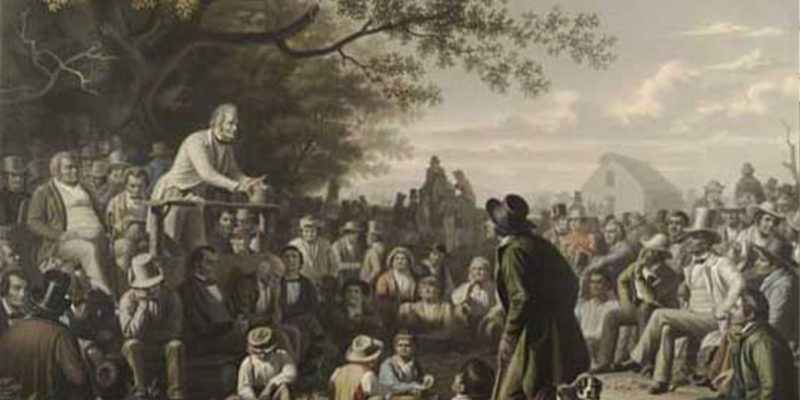Today, many perceive states’ rights as an obsolete or unjust political doctrine. Indeed, in serving as an ideological basis against centralized national power and helping to preserve slavery and segregation, states’ rights seem to have historically opposed justice and progress. Recent developments such as the need for swift action in foreign affairs and slowing the spread of new diseases appear to have rendered states’ rights inadequate for solving modern challenges. Meanwhile, calls for universal justice and the protection of certain rights have generated doubt over the independent decision-making powers of states. But is there an interpretation of states’ rights that does not augment these pressing problems, and may such an interpretation be renewed within modern American democracy?
Our attempt to answer these questions is immediately faced with a misconception surrounding states’ rights. It is generally held that states’ rights is a single and unchanging doctrine whose sole end is the dissipation of federal authority for its own sake. Within the American political tradition, however, there exist competing theories of states’ rights, including the theories of the Anti-Federalists, John C. Calhoun, and Alexis de Tocqueville. While these figures are not the only proponents of states’ rights in American political thought, I limit my analysis to these three sources.
I begin with the Anti-Federalist position on federalism. This thought argues for robust states’ rights. It asserts that strong, independent state governments are the best means of guaranteeing the natural rights asserted at the Founding. I then turn to the thought of John C. Calhoun, who developed with the greatest depth and clarity the view of states’ rights which overshadows contemporary debates surrounding federalism. In particular, he outlines a vision of states’ rights that protects the influence of political minorities in the form of state government which, by offering defense mechanisms for the self-government of the states, in practice leads to the preservation of the right of some to make others unequal. Finally, I examine Tocqueville’s interpretation of federalism. His ideas focus on the substantive social benefits of localism, rather than focusing on governmental and constitutional arguments. Tocqueville’s interpretation identifies townships, associations, and other local institutions as the best means of promoting political freedom; localism, according to him, allows citizens to participate in political life while educating them in democratic virtues. Ultimately, I argue that this Tocquevillian view of federalism is both compatible with and necessary for sustaining the modern American regime. By emphasizing the need for democratic virtues rather than formal institutions, Tocqueville’s federalism combats the degrading effects of centralization on both the mechanisms of democracy and the souls of the citizens.
Natural Rights and States’ Rights – The Anti-Federalists
States’ rights as a constitutional theory found its first forceful defense during the ratification debates, when the Anti-Federalists voiced their skepticism of stronger national power. To be sure, a variety of other interpretations of states’ rights positions were put forward during the Founding Era and the following decades by figures such as Thomas Jefferson. But it was the Anti-Federalists who collectively articulated one the most comprehensive views of states’ rights during this time.
In their opposition to the Constitution, the Anti-Federalists appealed to natural rights as the basis for their interpretation of states’ rights. While forming a government requires each individual to relinquish some of their natural liberties, the purpose of an artificial government is to secure the fundamental natural rights of the members of the political community. From this perspective, the Anti-Federalists argue that the national government is too distant to reflect the will, and thereby guarantee the natural rights, of the people effectively. It can at best provide a “crude uniform rule,” one that ignores the unique conditions of the states and risks giving rise to despotism (Storing 1981, 16). But if the national government is incapable of ruling with a view to the interests of each state, then individual liberty and happiness, the legitimate objects of artificial government, cannot be secured. A centralized national government is thus not constructed with the aim of guaranteeing natural rights. Hence, for the Anti-Federalists, who are united in their opinions about “the nature of man or the ends of political life,” the solution to the problem of centralized national government is preserving the authority that state governments have over their citizens (Storing 1981, 5).
For democratic government to secure natural rights, there must exist a closeness in proximity between the people and their government. The Anti-Federalists, therefore, favor state governments. Aside from its inability to govern the diverse people of each state effectively, the Anti-Federalists argue that representation in a large, centralized republic will be too few and out of touch, taking on an impersonal, if aristocratic, tendency. Moreover, the Constitution appears to diminish the influence of state representatives who “possess similar feelings, views and interests” with their constituents (The Federal Farmer 1985, 51). Crucial to preventing these effects is assigning state governments as the “immediate guardians” of the people, since states are more likely to command the confidence, trust, and affection of the people than a distant national government (Storing 1985, 115). As such, this proper constitutional form not only guarantees natural rights but has the additional benefit of promoting democratic virtues — the attachment to one’s laws and institutions, the “devotion to fellow citizens and to country” — that can only be fostered within the states, where the sentiments of the people are alike (Storing 1981, 20). Thus, while the Anti-Federalist’ constitutional theory focuses on the protection of natural rights, it also sees a connection between these rights and democratic virtues.
If the ends of the Anti-Federalist position are the protection of natural rights, it is also premised on a hostility to federal supremacy. Fearful that the new federal system of the Constitution radically consolidates power within the national government, they held that the state governments should remain relatively equal with the national government, lest the “liberties of this people” be made dependent on it (The Federal Farmer 1985, 43). The national government will legislate with a view to all states, applying laws uniformly without attention to the particular conditions of each. But because states represent communities with distinct interests, the Anti-Federalist position implicitly accommodates states which might ultimately oppose the spirit of self-government and universal extension of natural rights. As a constitutional theory, the thought of the Anti-Federalist can secure or violate natural rights. The philosophic attachment to universal natural rights and the constitutional arguments favoring independent states, therefore, are separable.
Political Minorities and States’ Rights – Calhoun
John C. Calhoun sees states’ rights as a protection of the independent self-government of the states themselves, appealing to history to argue that they are the primary locus of political attachment. At the core of his position, and in contrast to the Anti-Federalists, is an explicit rejection of natural rights, denying the universality of freedom and equality on the grounds that such rights depended on the unique, historical conditions of political communities. The “great and dangerous errors” of the American republic lied in the belief that all are born free and equal, “than which nothing can be more unfounded and false” (Calhoun 2007, 43). Freedom and equality are not natural but conventional; “when forced on a people unfit for it” these principles will become a “curse” for government (Calhoun 2007, 41). Accordingly, majority rule in the form of a centralized government poses a glaring threat to the self-government of states because of its potential to place universal moral and political standards upon the historically contingent standards of the individual states.
For Calhoun, this risk prompted the need for a concurrent system in which all political groups, or states, have equal power in making and vetoing national laws. Like the Anti-Federalists, his theory of states’ rights emphasizes the need for certain democratic or political virtues and, more importantly, proper constitutional forms. For Calhoun, however, such virtues and forms demanded a system of concurrent majorities in which institutional powers are placed in the hands of political minorities to ensure compromise between political interests. By empowering and protecting the rights of minorities (represented in the states), the concurrent system will secure the constitutional forms necessary to independent self-government while also promoting salutary political virtues through uniting each interest behind the pursuit of the “common good of the whole” (Calhoun 2007, 12, 19).
An immediate consequence of the concurrent system is the possibility that national policy can be stymied if states believe it to be unconstitutional. The House, Senate and President do not necessarily need the consensus of each state prior to making important national policy decisions, but the individual states retain the right to nullify an act of national policy after the fact. The effect is that the states are left to pursue their own interests without the interference of an energetic national government, while the national government remains effectual in matters that demand speed and dispatch. If this process threatens the national government from settling contentious policies, then the concurrent system implies that most political matters will be left to the states.
Indeed, Calhoun admitted that political interests are unwilling to compromise on unurgent matters due to personal pride and self-interest. So only when there is broad social consensus, or when, in moments of crisis, the “fatal consequences” of inaction forced interests to compromise, will the federal government be an effective instrument of policy (Calhoun 2007, 48-49). At the same time, this theory entails the denial of natural rights claims that would otherwise be binding on all states—most notably through the institution of slavery. The elevation of state-level self-government, therefore, at once protects political minorities while allowing for pervasive inequalities and disparaging the demands of universal justice.
Democratic Virtues and Localism – Tocqueville
While American sources focus on state governments as the most reliable means of preserving natural rights or of securing historical political communities from a centralized government, Alexis de Tocqueville points to localism as the source for securing the spirit of liberty. For this French observer, local government supports and develops the political freedom necessary to resist a potentially despotic, centralized government.
Political freedom, assumed to be an essential component of a healthy democracy, is in fact threatened by the excesses of equality which shape the “the laws, customs, and ideas” of a democratic society (Tocqueville 2002, 45). In a democracy, Tocqueville saw that the spirit of liberty and the spirit of equality conflict with each other. Liberty allows for inequality, yet all of history, Tocqueville observers, is a history of the advancement of equality. Even within a democratic regime, equality is such a fundamental desire that citizens are more committed to advancing it than to maintaining their political freedom. Due to the forces of materialism and individualism, Tocqueville argues that equality will move beyond the political sphere, degrading citizens to the pursuit of mediocre pleasures and making them apathetic toward public life. Thus, the desire for equality will ultimately prepare citizens to relinquish themselves, and the spirit of liberty, to the centralized, mild despotism of the state; one which will secure their private welfare at the expense of their freedom (Tocqueville 2002, 485).
Local institutions in the form of townships, juries, and other associations provide the space for the spirit of liberty to flourish amid equality. Through exercising their liberty, citizens are inculcated with the virtues necessary for counteracting individualism and materialism. Among the conditions that make localism possible in America is the lack of administrative centralization, where matters dealing with specific parts of the political whole are left to those parts instead of a centralized bureaucracy (Tocqueville 2002, 82). This decentralization strengthens the autonomy of local institutions that offer a “free and strong corporation that [the citizen] is a part of and that is worth his trouble to seek to direct” (Tocqueville 2002, 64). Furthermore, local institutions play into the desire of ambitious citizens by allowing them to participate in politics, capture the affection of their peers, and exemplify human greatness. In so doing, these citizens push back against the overwhelming and impersonal force of mild despotism and therefore sustain both an amount of freedom and equality within a democracy.
More than encouraging the practice of freedom, however, localism raises the quality of character among citizens. Indeed, through local institutions individual weakness, which will otherwise lead to individualism, brings citizens “closer to one another,” showing them that their individual interests are linked with the interests of others; that the fulfilment of their private self-interest requires the fulfilment of the public interest (Tocqueville 2002, 487). And if cooperation with others first arises from necessity, localism turns cooperation into a habit and taste. It not only instills the “value of public benevolence” in citizens but also educates them in “the nature of [their] duties” and “the extent of [their] rights” (Tocqueville 2002, 65). Localism thus improves the character and souls of democratic citizens; for if centralization places citizens in a state “below the level of humanity,” localism makes possible the active, political way of life (Tocqueville 2002, 665).
Conclusion
In this article, I have introduced and considered three foundations for states’ rights. But this examination has been made in light of the fact that modern America is skeptical about states’ rights. A recent national poll concerning the approval of state governments by their citizens confirms this view: while a 2022 Pew poll finds that more Americans have a favorable opinion of their state government than the federal government, 37 of the 50 state governments are under the unified control of one political party (Ballotpedia 2022). And in terms of population, about 75.7% of Americans live in a state with unified government (Ballotpedia 2022). It seems likely, then, that Americans are more favorable about their state governments not because they are favorable of states’ rights, but because they are favorable of the partisan politics of their state, which they want to see exist at the federal level.
I think that the skepticism of states’ rights traces its roots to the interpretations of states’ rights expounded by the Anti-Federalists and Calhoun, which focus on opposition to centralized federal authority and its institutional forms. Our usual hesitation toward states’ rights, however, overlooks the more substantive interpretation presented by Tocqueville, which shows that overcoming divisive forces such as individualism and materialism may require some reformulated understanding of states’ rights.
Most interpretations of states’ rights attempt to solve the problem of centralization by relying on democratic forms, arguing that strong and independent state governments that combat centralization are sufficient to make the case. But Tocqueville, arguing more explicitly about what centralization does to the human soul and the quality of one’s character, offers a more robust defense for local governments to those of us living in a different time with different institutional expectations. He shows more emphatically than the Anti-Federalists and Calhoun that local institutions cannot operate without virtue, and the habits of and tastes for local self-government are constantly needed to push back against the degrading effects of centralization.
Perhaps resisting the mild despotism of our time, the administrative and regulatory state, requires a renewed commitment to localism. Such a commitment, of course, requires its own institutional and constitutional arguments. But we should not confuse the forms for the substance, and Tocqueville more than others shows why a healthy life in the modern world requires us to think about the “rights” of states and localities.
References
“Americans’ Views of Government: Decades of Distrust, Enduring Support for Its Role.” Pew Research Center. Accessed July 5, 2022. https://www.pewresearch.org/politics/2022/06/06/levels-of-government-federal-state-local/.
Calhoun, John C. A Disquisition on Government. Edited by H. Lee Cheek, Jr. South Bend: St. Augustine’s Press, 2007.
Calhoun, John C. Union and Liberty: The Political Philosophy of John C. Calhoun. Edited by Ross M. Lence. Indianapolis, IN: Liberty Fund, 1992.
“State Government Trifectas.” Ballotpedia. Accessed July 5, 2022. https://ballotpedia.org/State_government_trifectas/.
Storing, Herbert J. What the Anti-Federalists Were For. Chicago: University of Chicago Press, 1981.
The Anti-Federalist: Writings by the Opponents of the Constitution. Edited by Herbert J. Storing and Murray Dry. Chicago: University of Chicago Press, 1985.
Tocqueville, Alexis de. Democracy in America. Translated by Harvey Mansfield and Delba Winthrop. Chicago: University of Chicago Press, 2002.




 Compass is an online journal that provides a space for the work of talented undergraduates who have original and well-articulated insights on important ideas and issues relating to American democracy understood in the broad contexts of political philosophy, history, literature, economics, and culture.
Compass is an online journal that provides a space for the work of talented undergraduates who have original and well-articulated insights on important ideas and issues relating to American democracy understood in the broad contexts of political philosophy, history, literature, economics, and culture.